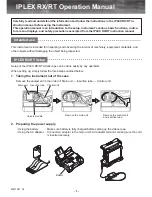
7-4
Peak Tuning Procedure
SRS Residual Gas Analyzer
Peak Tuning Procedure
Introduction
When analyzing a sample, you expect the peaks of the different gases to be displayed at
their correct mass-to-charge ratio values and the peak widths to be less or equal than 1
amu at 10% of peak height. The correct location of the peaks is essential for accurate
qualitative analysis, and unity resolution (
'
m
10%
=1 amu) minimizes the overlap between
adjacent peaks. Both the calibration of the mass scale and the widths of the peaks can
vary with time due to aging of the head. Changes in resolution are particularly serious
since they affect the sensitivity of the RGA and introduce errors in the partial pressure
measurements.
The Peak Tuning procedures described in this section allow the user to calibrate the mass
scale and the resolution,
'
m
10%
, of the mass spectrometer. The SRS RGA has a very
solid design and this type of tuning procedures should rarely be needed.
WARNINGS
The peak tuning procedures should be performed by qualified personnel
only. A mistuned RGA Head will give Erroneous Readings until it is retuned
properly.
Peak Tuning should only be attempted after the unit has been warmed up
(with the filament on and under typical operating conditions) for at least a
one hour.
Peak Tuning
requires a mixture of gases whose mass spectra is well known. In general, a
two gas mixture, one with
low mass
peaks and one with
high mass
peaks, is sufficient.
The sample is introduced into the vacuum, and the quadrupole mass filter parameters,
referred to as Peak Tuning parameters, are adjusted based on the sample analog spectra.
The mass scale is adjusted so that all peaks are displayed at their correct mass-to-charge
values, and the peak widths,
'
m
10%
, are adjusted to unity (or smaller) values. The two
tuning procedures are referred to as
Peak Position and Peak Width Tuning
,
respectively.
Note
: A mixture of He, Ar, Kr and Xe inert gases is used at SRS to Peak Tune the
RGA’s. The resolution is adjusted to 1 amu and peak tuning parameters are saved into the
RGA Head before shipping. The inert gases cover a broad spectral range, and being inert
they do not interact with the RGA probe and do not contribute to its aging.
Peak tuning can be easily performed with
RGA Windows
using the Peak Tuning
command of the Head Menu. The program provides password protection for locking out
the Peak Tuning Parameters so that casual users cannot alter the mass scale calibration or
the spectrometer’s resolution.
An extra copy of the tuning parameters determined at the factory for the mass filter is
saved in the RGA Head before shipping, and those values can be retrieved at any time in
case they are necessary. Consult the RGA Windows chapter of this manual or the RGA
Summary of Contents for RGA100
Page 4: ...SRS Residual Gas Analyzer iv...
Page 18: ...xviii Command List SRS Residual Gas Analyzer...
Page 46: ...2 14 Residual Gas Analysis Basics SRS Residual Gas Analyzer...
Page 66: ......
Page 78: ...4 12 Mass Filter Power supply SRS Residual Gas Analyzer...
Page 104: ......
Page 107: ...Programming the RGA Head 6 3 SRS Residual Gas Analyzer Error Byte Definitions 6 69...
Page 216: ...8 26 Quadrupole filter cleaning SRS Residual Gas Analyzer...
Page 246: ...11 2 SRS Residual Gas Analyzer...
Page 247: ......
Page 248: ......
Page 268: ...Appendix B SRS Residual Gas Analyzer 7...
Page 312: ...Appendix D SRS Residual Gas Analyzer 27...
















































